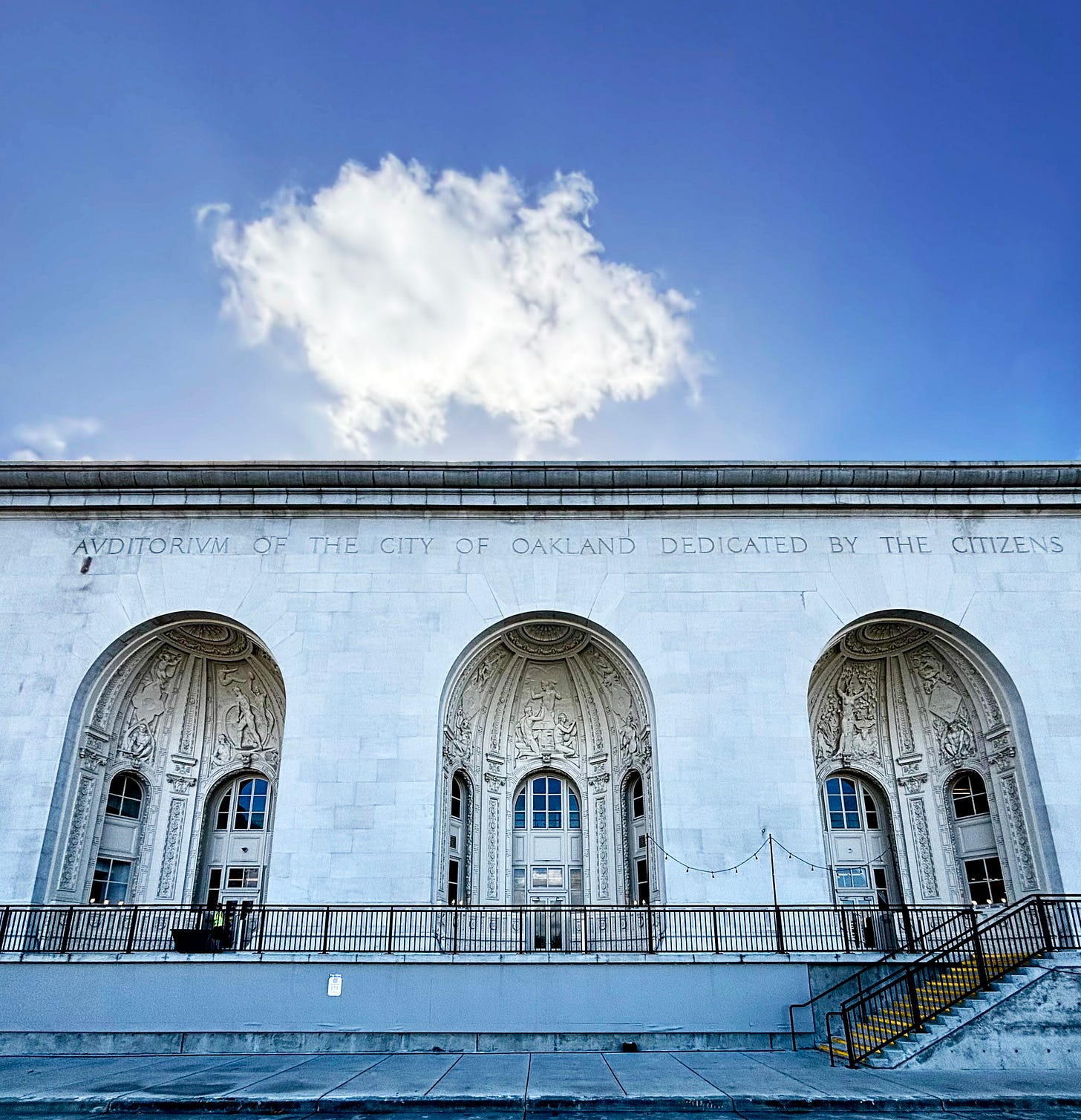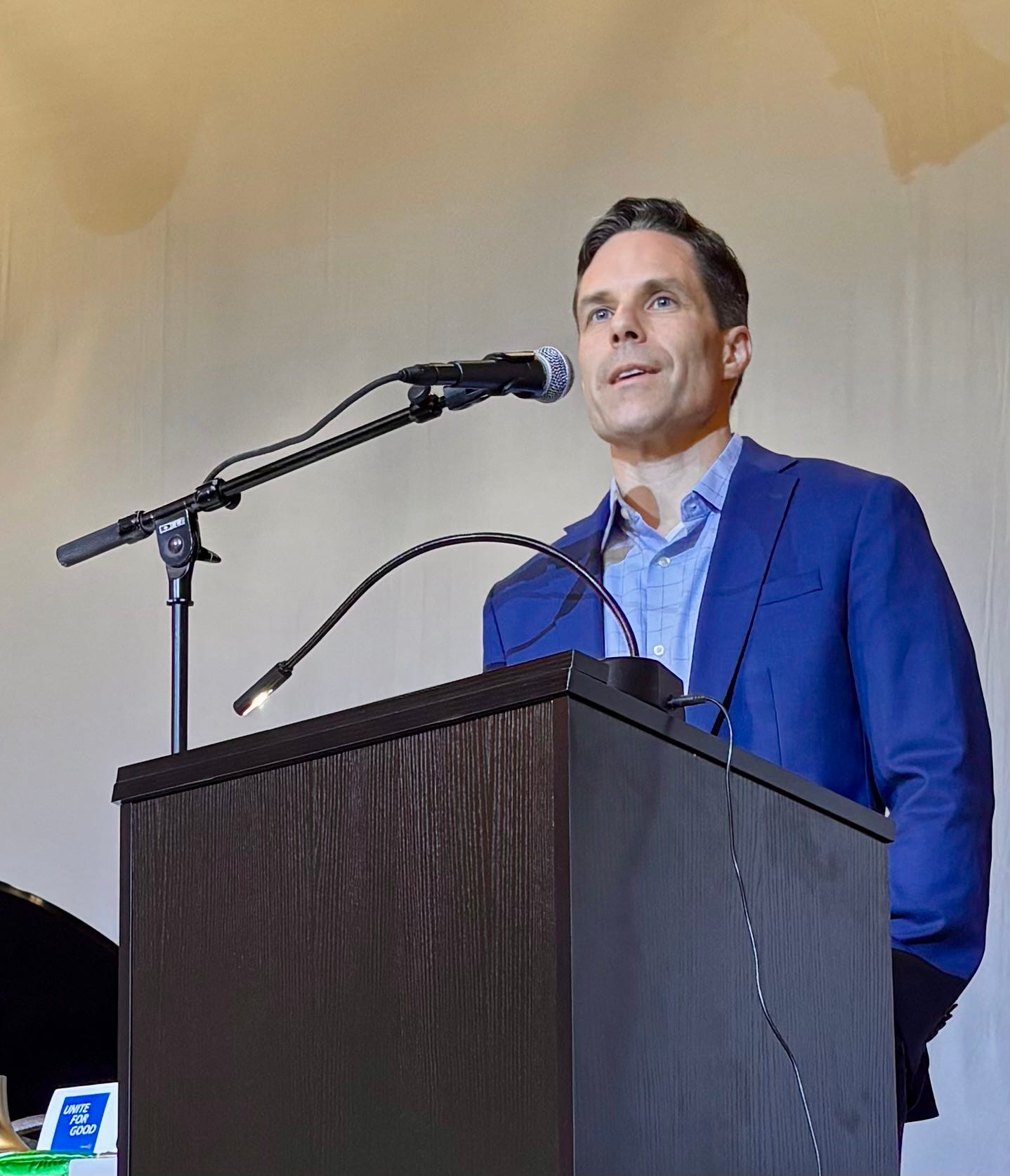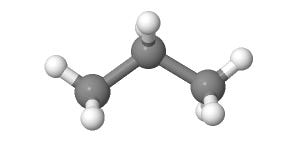The Infinite Unknown
The value of uncertainty in life, liberty, and the pursuit of happiness

Oakland Report co-founder Tim Gardner was invited to deliver a speech to the Rotary Club of Oakland at the Henry J. Kaiser Center for the Arts on November 6, 2025. Here below is a transcription of his remarks.
A few weeks ago, when David Stein reminded me I was giving this talk, I thought:
What the heck does one talk about at Rotary?
How do I sneak in a bit of science?
And how do I make it politically interesting, while not being Political?
The outcome is a strange brew of Oakland, tribalism, and Schrödinger’s equation1 — and an attempt to persuade you that uncertainty is a superpower; that it is the key to life, liberty and the pursuit of happiness.
I’m not sure this is gonna fly, but there’s only one way to find out. So here we go.
The primacy of doubt
Let me start with a quote from James Gleick, a historian of 20th century science. Gleick was describing Richard Feynman, one of the most brilliant physicists of all time:
Feynman believed in the primacy of doubt, not as a blemish upon our ability to know but as the essence of knowing.
The alternative to uncertainty is authority, against which science had fought for centuries.2
State of the city
If you knew of me before today, it was probably through Oakland Report — a civic news and commentary site that I co-founded with a neighbor, Jacob Rukin. We launched it in 2023 in response to an alarming decay in Oakland’s city services and lawfulness.
Just a few of the triggers for me and Jacob were:
A baby getting shot on our street (non fatally)
A woman getting mugged at home by a gang of teenagers
Overflowing trash, graffiti, encampments, drugs, and prostitution.
But it wasn’t just crime and blight. It was city leadership at the time that was dismissive, bordering on gaslighting, of its residents — as if the decline was just our state of mind, not a daily reality.
Their words aimed to manage citizens more than represent them. Their acts seemed extractive of the middle class and businesses that form the city’s backbone.
One most egregious example is the graffiti ordinance – ordinance 13146. It fines businesses who are vandalized by graffiti if they don’t remove it immediately.
Quite literally, this city fines the victims for the crimes perpetrated on them.3
Another example: There is presently a $350 million surplus in the pension tax account that funds the 1976 Police and Fire Retirement System. Only $70 million in payments are needed to fully fund it. Yet the city continues to collect another $80–100 million a year in “override” taxes on top of the $350 million, which cannot legally be used elsewhere.4
And then there is the 15% deficit spending despite years of stark warnings from its own finance department. And the raiding of restricted ballot measure funds to pay for it.5
The city did not rectify these problems with deep spending reforms. Instead it levied a regressive sales tax increase in April, and the city seeks another $40 million tax in June.6
This is not responsible governance.
A biased media
Yet it was actually problems at the Oakland public schools that seeded the founding of Oakland Report.
In 2022, a popular local media organization promoted misinformation and hearsay about school closures in an ideologically biased series of articles. The articles helped elect a new slate of board members who reversed the previous decision to close 11 financially unsustainable schools.
The board had no realistic alternative. And it accelerated the school district down its present path back to insolvency.7
Of course, the kids are paying the price. OUSD students test almost a full grade behind their California peers, and 2.4 grades behind the national average.8
An experiment in evidence
This episode left me fuming — as much about the state of our media as the dysfunction in local governance.
Today’s media feeds us superficial extremes — the dramatic, the vapid, or the ideological. It arrogantly assumes readers have not the ability, interest or patience to go deeper.
But no one should blindly trust the media, nor any public leaders, nor Oakland Report — just because we said something.
So we started Oakland Report as an experiment — Could we rekindle a reverence for the search for truth.
We want citizens to demand evidence. To ask:
“How do you know that?”
“Can I verify it?”
Could we bring a dose of the scientific method into civic journalism? In science, judgement is expected, but so too is a dispassionate exposition of the evidence.
Could we make such an approach compelling to the reader? Deep analysis can’t be left to just the policy wonks. It is foundational to a healthy democracy.
Our approach is simple — deliver stories focused on basic life needs, and ground them in primary evidence, rigorous analysis, and a pointed but dispassionate voice.
Most importantly, give readers the evidence to critically judge for themselves.
To our surprise, the initial experiment has been a success. With only part-time volunteers, our readership has grown to nearly 50,000.
Doubt as a discipline
This insistence on evidence is hard to live by. It requires a healthy doubt, even of oneself.
Francis Bacon — the scientist who articulated the scientific method in 1620 — warned:
“God forbid that we should give out a dream of our own imagination for a pattern of the world.”9
In other words: May God forbid us from mistaking our speculative ideas for truth itself.
At Oakland Report, we research stories by challenging our own initial thesis. We question the outrage that motivated us in the first place.
When you frame your thinking with doubt, you open yourself to the unknown. And sometimes you discover the truth.

Lessons from electrons
But the truth is elusive. You never can know it completely. Let me illustrate with a brief step into science.
January 2026 marks the 100th anniversary of Erwin Schrödinger’s equation, one of the most profound discoveries of humankind:10
It describes the motion of electrons in atoms and molecules.11 It is the foundation of modern physics, and chemistry — perhaps more important to modern society than Einstein’s E = mc2.
Electrons determine nearly everything about the materials we touch: why steel is strong, why rubber stretches, the color of your clothes. Electrons are literally what allows you to breathe. And this one equation can predict it all.
But there is a problem. We can’t solve it exactly, except for the most simple cases.12 The largest molecule ever solved exactly is propane — with just 11 atoms. It has more than 1 trillion configurations — each must be calculated to solve the equation.13
The second-simplest amino acid in your body is alanine. To solve it would require more calculations than there are atoms on Earth.14
Even though we know a law of nature exactly, we still can’t know its deepest truths. But Science doesn’t demand certainty — it demands only the will to get closer.
Over these 100 years, scientists have devised clever ways to get ‘good enough’ answers using clever approximations of the equation — good enough to build the myriad of technologies that enable our modern lives.
Schrödinger’s equation is a mirror of nature itself — an infinite well of answers about the material world. But it reveals its bounty only to those patient enough to probe it again and again, knowing they’ll never reach the bottom.
From electrons to superpowers
Now, back to Oakland — and to us. What troubles me most about our civic life today, on both the right and the left of politics, is a seeming disregard for evidence and reason.
It feels that we’ve replaced the search for truth with ideology, critical thought with slogans, personal judgment with memes. We let the games of capital-P Politics take precedence over the difficult, relentless work of lower-case-p politics.
It feels we have forsaken the work of understanding.
When you forgo understanding, then corruption follows, because there’s no objective check on hubris.
From hubris, we slide to tribalism — where loyalty to the tribe, and to its loudest leaders, outweighs everything else.
And tribalism is only a short skip away from authoritarianism — where ‘winning’ supersedes life, liberty and lawfulness.
And we can get to this miserable place from the right or the left.
The antidote is doubt.
Doubt demands evidence before belief, even of oneself.
Doubt opens us to seeing the unknown truth.
Doubt fuels us to seek an ever-improving grasp of that truth.
Doubt protects us from the abuses of authority.
An endless journey
Doubt may sound like something to be feared — wandering aimlessly through uncertainty — mistrusting everything, even oneself.
But it’s the opposite. Doubt is the thing that makes life rich — it invites wonder, curiosity, and growth.
In his final moments, Richard Feynman said:
“I think it’s much more interesting to live not knowing than to have answers which might be wrong …
I’m not absolutely sure of anything … I don’t feel frightened by not knowing things, by being lost in a mysterious universe without any purpose, which is the way it really is as far as I can tell.”15
The joy of life — and perhaps our salvation as a species — is to unflinchingly seek truth wherever it may lead us.
Wikipedia contributors. “Schrödinger equation.” Wikipedia, The Free Encyclopedia. Wikipedia, The Free Encyclopedia, 14 Sep. 2025. Accessed Nov. 6, 2025. https://en.wikipedia.org/wiki/Schrödinger_equation
Gleick, James. Genius: The Life and Science of Richard Feynman. New York, Pantheon, 1992, p. 372.
City of Oakland, Municipal Code Chapter 8.10 - Vandalism By Defacement Of Property (Graffiti), 2013. https://library.municode.com/ca/oakland/codes/code_of_ordinances/283553?nodeId=TIT8HESA_CH8.10VADEPRGR
Gardner, Tim. “Oakland paid $450M in 2023 for pension costs and above-inflation wage increases,” Oakland Report, Sep. 10, 2024. https://www.oaklandreport.org/p/oakland-paid-450m-in-one-year-for
Gardner, Tim, and Loren Taylor. “Oakland faces an unprecedented financial crisis that was years in the making,” Oakland Report, Apr. 4, 2024. https://www.oaklandreport.org/p/oakland-faces-an-unprecedented-financial
Reinhart, Sean S. “‘Death and taxes’ - Oakland City Council is the one who knocks,” Oakland Report, Oct. 27, 2025. https://www.oaklandreport.org/p/death-and-taxes-oakland-city-council
Borek, Bob. “Oakland Unified School District must cut at least $115 million in the next two weeks to avoid state receivership,” Oakland Report, Oct. 26, 2025. https://www.oaklandreport.org/p/oakland-unified-school-district-must
Education Recovery Scorecard – Oakland Unified School District Report, Center for Education Policy Research at Harvard University & The Educational Opportunity Project at Stanford University, Feb. 2025, accessed Nov. 6 2025, https://educationrecoveryscorecard.org/wp-content/uploads/2025/02/report_CA_0628050_oakland-unified.pdf
Bacon, Francis. Instauratio Magna (The Great Instauration). London, J. Billium, 1620
Schrödinger, Erwin. “Quantisierung als Eigenwertproblem.” Annalen der Physik, vol. 384, 1926, pp. 361-376. https://doi.org/10.1002/andp.19263840404
Schrödinger, Erwin. Collected Papers On Wave Mechanics. London and Glasgow, Blackie & Son Limited, 1928. https://archive.org/details/in.ernet.dli.2015.211600
Gardner, Tim with ChatGPT 5.0, “Computational complexity scaling,” OpenAI ChatGPT, shared link, accessed Nov. 6, 2025, https://chatgpt.com/share/690d709a-7094-8004-89e8-3ca74a83ae8d
Hong Gao et al., “Distributed Implementation of Full Configuration Interaction for One Trillion Determinants,” J. Chem. Theory Comput. vol. 20, no. 3, 2024, pp. 1185-1192. https://pmc.ncbi.nlm.nih.gov/articles/PMC10867839/?utm_source=chatgpt.com
Gardner, Tim with ChatGPT 5.0, “Computational complexity scaling.”






The hope for good government, for rational and scientific public administration, was and still is the promise of the Progressive Movement. But that hope has always been fatally misplaced. The scientific method works because it subjects ideas to objective scrutiny, and forces those that cannot withstand such scrutiny to failure. Similarly, markets work because they subject commercial activities to failure if they cannot independently sustain themselves. No similar mechanism exists for government. Each individual consumer personally benefits or suffers when they purchase a product or service; the most any individual voter can do is express an inconsequential opinion—unless they choose to “vote with their feet” and move to a different jurisdiction.
Before the Enlightenment, all human endeavors were conducted as matters of faith or zero-sum exercises of raw power. The genius of the American Experiment wasn’t “democracy” or “equality” but limited, distributed and competitive governance, along with a basic set of hard-coded freedoms. Adam Smith was right: there really is a great deal of ruin in a nation. For many, maybe most, Oakland “works.” And when it stops working, they’ll leave. Until then, nothing much will change in Oakland.
Superb (I think but am not totally sure)!